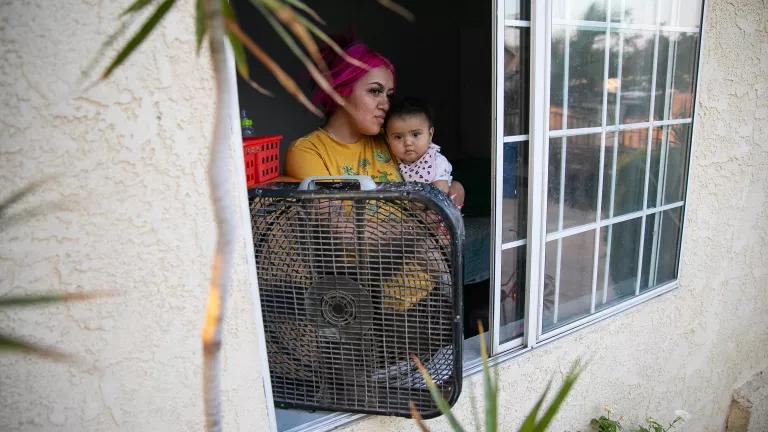
Redwoods in Muir Forest, California
Dreamstime
The 2023-24 legislative session is well underway in Sacramento. Most bills have passed their first policy committees and are sitting in Appropriations Committees or moving to the floor. There are dozens of new members of the California legislature and NRDC and our allies have been busy meeting them and bringing them up to speed on the most pressing environmental issues facing our state.
State Budget Priorities
We are active on several issues related to the state budget. Governor Newsom's May Revise provided updated revenue projections based on April tax returns and proposed a funding plan for all of state government. The May Revise did not recommend deeper cuts to climate programs than the January budget.
This year, most Californians were allowed to delay sending in their tax payments until October due to weather emergencies that impacted the state through the winter months, so we won’t have a full revenue picture as the state’s FY 23-24 budget is negotiated in the coming weeks.
We do know that California is facing a budget deficit in the range of $32 billion and state leaders are contemplating difficult choices over where to make reductions in order to pass a balanced budget. The Governor’s January budget proposed deep cuts to programs that help reduce transportation emissions, support community resilience, and protect the state’s natural resources, food systems and biodiversity.
The state senate recently issued its own budget proposal titled, “Protect Our Progress: Senate Budget Plan” that takes a different tack to solving the state’s budget challenges. Instead of deep cuts to programs, the senate plan proposes recouping some corporate taxes lost through the Trump administration’s tax cuts, a move which would generate approximately $7 billion in new revenues. We’ve been working to identify sources of funding as well, such as eliminating subsidies for the oil industry, to help narrow the budget gap.
Budget negotiations now ramp up following the release of the May Revise as the legislature aims to pass a budget by June 15. Our team and our partners are watching key budget items including:
Building Decarbonization
Our homes, schools and community centers present an opportunity to reduce greenhouse gas emissions, save money, and improve occupant health and comfort. We’ve made progress over the past several years with a range of important policies, including AB 3232 (Friedman) and SB 1477 (Stern) that were enacted in 2018. It’s imperative to protect state funding for building decarbonization in homes, schools, and community centers to move away from fossil fuels and improve air quality in our communities.
Governor Newsom’s January budget proposal would cut $87 million from these programs and delay funding for an additional $370 million for the Equitable Building Decarbonization Program at the California Energy Commission. This program is intended to directly benefit the lowest income Californians and provide them with safe and healthy appliances and home upgrades. Cutting funds for this program is counter to the state’s climate goals and equity commitments and these funds should be restored by the legislature.
Help with utility bills to avoid shutoffs
The budget reverts $400 million in California Relief Funds in 2022-23 to the General Fund, for savings from the California Arrearage Payment Program, based on actual applications received and approved for funding. The program provided financial support to eligible residential customers with past due energy utility bills acquired during the COVID-19 pandemic and we know that people are still recovering financially. The removal of these funds leaves many Californians, who still cannot pay their utility bills, vulnerable.
Zero-Emission Vehicles
To continue reducing greenhouse gas and air pollution in California, we must aggressively remedy the State’s most persistent source – transportation; specifically, cars, trucks, locomotives, and other off-road freight vehicles.
The January budget proposed $2.5 billion in cuts to incentive programs for zero-emissions vehicles – this following Newsom’s opposition to Proposition 30 on the November ‘22 ballot; a measure that would have generated billions in revenue over the next twenty years for zero-emission vehicles, charging infrastructure and wildfire prevention.
In recent years, port-related pollution has spiked. Reinstating state funding programs – such as those that target port-related vehicles like locomotives, cargo handling equipment, and harbor craft -- can provide important incentives to transition California ports to zero-emissions, aligned with state and local goals. Federal infrastructure and Inflation Reduction Act funding will help support clean transportation programs but state investments are also needed.
The California Air Resources Board boldly adopted new sales requirements on zero-emission vehicles and freight transport, but must couple these sales requirements with incentives to make clean vehicles affordable for all Californians.
Clean Mobility Choices
Investing in public transit and active transportation reduces pollution from cars and trucks, and makes communities safer and more accessible for Californians when they choose to walk, bike or take transit. Millions of Californians who don’t have reliable access to a car and must have affordable, safe transportation options.
California’s leaders have an opportunity to flex federal highway funds to public transit, and should take advantage of this opportunity in the ’23-’24 budget. They can also shift funds from the State Highway Account to more climate-friendly options like pedestrian and bike improvements. Projects should be designed along with the most impacted communities so that final decisions reflect those communities’ needs and priorities.
The Senate budget proposal restores many of the cuts proposed in January and signals a path forward to avoid the public transit fiscal cliff.
Natural Resources and Biodiversity
Investments in infrastructure, and the restoration and preservation of our water and natural resources sustain our communities, ecosystems, economies, and health. The state of California made pioneering commitments to fight the biodiversity and climate crises using nature-based solutions in the 2022-23 budget. California is looked to as a global leader in the effort to protect 30% of our lands, waters, and ocean areas by 2030 to stem biodiversity collapse. This past December the state showcased these efforts at the global United Nations Convention on Biological Diversity in Montreal – winning accolades for their robust and equitable approach to the 30x30 campaign and work to elevate nature-based solutions to fight climate change. California must continue to lead by building on its investments in these areas.
We are working with the Newsom administration, the legislature, and the Power in Nature Coalition to maintain our progress on 30x30. We are prioritizing programs that can’t be funded by bonds (scientific studies, monitoring and management for example) and focusing on key programs that are the foundation for efforts to address both the biodiversity and climate challenges.
Sustainable Food and Farming
California’s agricultural community plays a key role in building a healthy, resilient, and sustainable future. Yet despite the potential of farm and rangelands and the food and farming sector as a whole to help California meet its climate action goals, Governor Newsom proposed cuts to key programs that support small and mid-scale and BIPOC growers, enhance our local and regional food systems, prepare our farmlands for drought, and bring healthier food within closer reach of communities that need it most.
We are relieved that NRDC priority programs like the Farm to School Incubator Grant Program and the Organic Transition initiative were spared from cuts so far. We are reviewing the Governor’s May Revise for signals on how these programs will fare in the 2023-2024 budget and beyond. We can stretch older dollars to some extent but if the state expects to realize long-term benefits from these crucial investments, continued support will be essential. We are also keeping an eye on whether the May Revise will fund dairy digesters. Limited state funds should not be used to expand infrastructure that disproportionately burdens low-income communities of color with pollution from California’s industrial dairies.
Budget deficits call for difficult choices. However, it is becoming increasingly clear that the impacts of climate change are here and now. Healthy soils and thriving ecosystems can help our farmers and ranchers withstand water shortages, wildfires, flooding, and extreme heat. Reducing reliance on synthetic inputs like pesticides and fertilizers will help reduce the climate footprint of California’s agriculture sector (and provide myriad other benefits). Cutting the state’s climate, sustainable agriculture, and natural resources budget now will only burden Californians with enormous costs later. We are ready to work with coalition partners, legislative leadership, and the Newsom administration to maintain critical climate, sustainable agriculture, and natural resources funding while making smart investments now that save money for all Californians.
Policy Priorities
NRDC is sponsoring and supporting several priority bills moving through the legislative process in Sacramento. In California, organizations who lead the advocacy efforts for a bill are called “sponsors” or “co-sponsors.” The legislator carrying the bill is called the “author” and has primary responsibility for the contents and path of each bill.
Our legislative priorities for this year include:
AB 80 (Addis) – to establish an offshore wind science entity, like the Regional Wildlife Science Collaborative for Offshore Wind on the East Coast.
AB 363 (Bauer-Kahan) – to protect pollinators and human health by requiring the Department of Pesticide Regulation to regulate neonic pesticides on outdoor ornamental plants, trees, and turf within a specific timeframe. The bill also requires the Department to look at the cumulative impacts of neonics and other pesticides on health and our environment. This bill is a follow up to Governor Newsom’s veto of AB 2146 in 2022.
AB 408 (Wilson) – Climate-resilient Farms, Sustainable Healthy Food Access, and Farmworker Protection Bond Act of 2024 – proposes a bond that would go before the voters in 2024. The measure would fund programs that increase access to healthy foods, protect our essential farmworkers, support historically disadvantaged farmers, and improve soil health and the climate resiliency of farm and rangelands.
AB 421 (Bryan) – Shifts power back to the people in California’s referendum process by increasing the transparency of paid signature gathering and requiring at least 10 percent of the signatures obtained in the referendum process to come from non-paid signature gatherers.
AB 538 (Holden) – Helps improve electricity reliability and affordability by beginning the process of transitioning the California Independent System Operator (CAISO) to a regional entity.
AB 660 (Irwin) – Standardizes date labels on food to provide clarity for consumers and help reduce food waste.
AB 1167 (W. Carrillo) – Prevents oil wells from becoming “orphaned” by requiring proof of full bonding before a well can be transferred to a new operator, thereby saving state taxpayers on the costs of cleanup.
AB 1290 (L. Rivas) – Eliminates “problematic and unnecessary” plastics that are hard to recycle or harmful to human health, or both, such as plastic packaging containing toxic, “forever” PFAS chemicals or PVC (which is made from the toxic chemical, vinyl chloride, that was involved in the East Palestine, Ohio train derailment).
AB 1525 (Bonta) – Requires 60 percent of the funds allocated to California’s transportation agencies to be directed toward communities bearing the brunt of climate change and pollution.
AB 1572 (Friedman) – Saves water by phasing out irrigation of turf that is not used and ornamental.
AB 241 (Reyes) and SB 84 (Gonzalez) – Reauthorizes various vehicle registration and other automobile fees to fund clean transportation programs.
SB 244 (Eggman) – Establishes a “right to repair” for consumer electronics and appliances by allowing owners and independent services dealers to access parts, tools and service literature from the manufacturers.
SB 253, SB 261 and SB 252 (Gonzalez, Stern, Wiener, Becker) – Climate Accountability Package. SB 253 (Wiener) ensures that billion-dollar companies doing business in California disclose their entire emissions for the life cycle of their products. SB 252 (Gonzalez) requires the state’s public pension funds to divest from fossil fuels. And SB 261 (Stern) requires corporations, financial institutions and other businesses incorporated in California, with at least $500 million in revenues, to annually disclose to the California Air Resources Board their climate-related financial risk.
SB 337 (Min) – Puts the state’s 30x30 goal, established via an Executive Order from Governor Newsom, into state law. 30x30 is an international effort to conserve 30 percent of nature by 2030 in order to protect biodiversity and help stem the climate crisis.
SB 410 (Becker) Powering up Californians Act – helps improve planning for building and vehicle electrification by establishing at work group at the Public Utilities Commission and requiring the PUC to set deadlines and transparency measures to better track utility progress on widespread electrification.
SB 556 (Gonzalez) establishes civil liability on oil companies for health impacts from living near drilling.
SB 795 (Stern) – requires the California Energy Commission (CEC) to develop and implement an electronic statewide heating, ventilation, and air conditioning (HVAC) equipment sales registry and compliance tracking system to ensure proper installation of HVAC equipment for energy efficiency and safety.
We support and oppose other important bills in the areas of climate change, public health, clean energy, and community resilience. Our positions on many environmental bills are listed here.
Administrative Action
We’re urging the Newsom administration to use California’s immense purchasing power to facilitate adoption of low-emission building materials, especially concrete. The state can also lead on protecting global biodiversity and fighting climate change by requiring state contracts and building projects to incentivize recycled paper and sustainable wood products to protect tropical and boreal forests across the globe.
We are also calling on the Newsom Administration to act quickly to rein in harmful and unnecessary uses of neonicotinoid insecticides that are decimating California’s pollinators and unique biodiversity and threatening the health of Californians. The Department of Pesticide Regulation (DPR) must quickly finalize its re-evaluation of the impacts of non-agricultural uses of neonicotinoids, while considering their harms to native pollinators, aquatic ecosystems, and human health. Additionally, DPR must issue regulations governing use of pesticide-treated seeds that cover millions of acres of California soil.
There will be more to report on these priorities and other issues as we move into the summer months and toward the conclusion of this year’s legislative session on September 15. Stay tuned for NRDC’s California updates.



